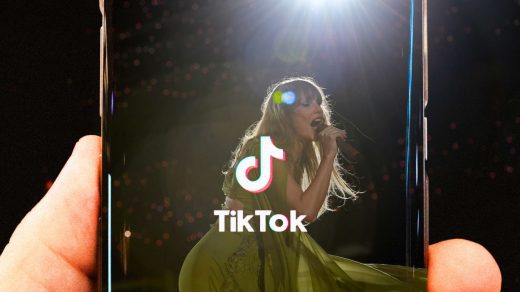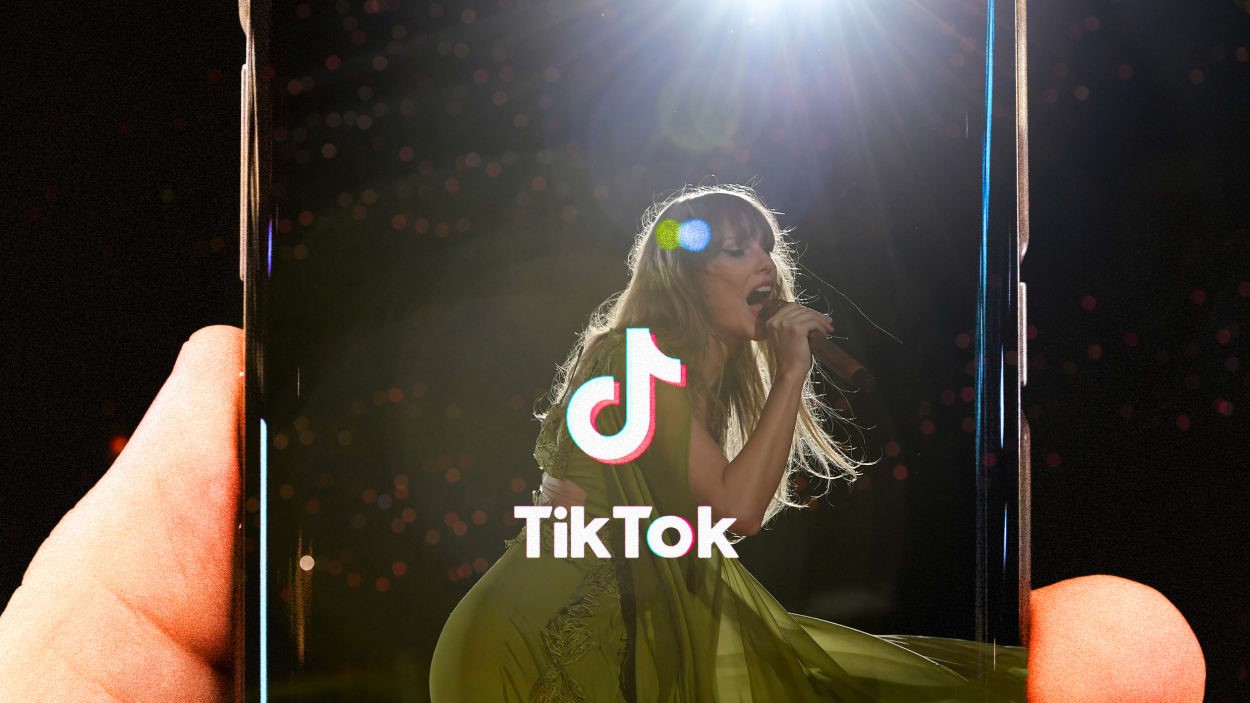TikTok is facing its own Napster moment
Last week, Universal Music Group (UMG) pulled their catalog from TikTok. In an instant, videos that once were soundtracked to the voices of Taylor Swift and Post Malone fell silent. And now, not even the artists themselves can share their music on the app.
In an open letter published last week, UMG placed the bulk of the blame on concerns about artificial intelligence. “TikTok is allowing the platform to be flooded with AI-generated recordings—as well as developing tools to enable, promote and encourage AI music creation on the platform itself,” the corporation wrote, going so far as to accuse the short-form video app of “sponsoring artist replacement by AI” (a charge that’s more than a little strange, considering, as The Verge reported, UMG has an AI music agreement already in place with YouTube.)
But we’ve seen this before. For the past 25 years, the web has been caught in a push-and-pull cycle between copyright holders and streaming platforms. And every time a crackdown like this happens, it only results in three things: More piracy, ironically enough, a worse environment for fans, and more hoops for smaller artists to jump through. The end of TikTok’s audio golden age is already shaping up to be no different.
In July 2001, Napster was shut down amid a flurry of lawsuits and congressional hearings. This didn’t kill music piracy, of course, but it pushed it to the fringes of the web and created a schism within the music industry that we still see today. Big artists on major labels like Metallica could easily go after individual pirates, while smaller artists either had to accept that their music would end up on apps like Kazaa or Limewire or BitTorrent, or find new distribution models. On that latter front, artists like Radiohead and Jeff Rosenstock were early pioneers and, in a lot of ways, they actually did define how the music industry would begrudgingly change thanks to social media.
“The record companies, what they were selling was a product, as opposed to selling a licensing access,” says Neil Turkewitz, a former RIAA vice president. “And I think that’s been the evolution in thinking in the music sector, away from the notion of ‘is this a replacement for sales?’”
The arrival of YouTube in 2005, and then sites like SoundCloud and Spotify three years later were what helped that evolution happen. The streaming era led to partnerships and licensing agreements reached between the labels and the platforms; the question was always whether or not a streaming company could scale up fast enough to negotiate licensing agreements for all the stolen music on their platform. This is exactly what TikTok’s strategy was when it launched in the U.S. in 2017. (Neither TikTok nor UMG immediately responded to a request for comment.)
TikTok’s parent company ByteDance created the app by taking many of the core features from their Chinese app Douyin and adding them on to an app they had recently acquired called Musical.ly. Musical.ly was a lip-syncing platform that had managed to build a growing community of former Vine stars. And so, many of the earliest TikTok trends were dances or lip-syncs because that’s what the initial user base already knew.
Audio has remained a key part of TikTok’s DNA. In fact, its tool for uploading audio files directly to the platform was a feature that had basically gone extinct from the social web due to fears of piracy. And the MP3 files users were uploading to TikTok created a powerful discovery tool inside of the app. If I upload an audio file to TikTok, other users can click on it and use it. And the app curates all of those videos in the same subcategory, making audio files almost function like a hashtag or a hyperlink.
But according to Sophia Smith Galer, a prominent TikTok creator and former Vice reporter, this system was never particularly trustworthy.
“Platforms can’t be trusted to give you reliably ‘legalled’ audio,” she says. “So I don’t use them anymore. I will do so very sparingly—only if there is one tied to a trend that I decide to seize on because quick zeitgeist engagement overrides my fear that the app hasn’t legalled it properly.”
But broken as it may be, it has been very good for the music industry. According to a 2023 study—which, yes, was conducted by TikTok—an overwhelming majority of users discover music on the app and it does correlate with both streams on platforms like Spotify, as well as with concert ticket sales. It’s worth noting that there are studies going back at least a decade that show similar benefits to open access to music.
“I think people underestimate just how powerful TikTok is when it comes to discovery,” says Rachel Karten, a social media consultant and writer. “The Stanley Cup craze exists because of TikTok—that type of immediate adoption would not (and could not) happen on any other platform. Same goes for music.”
And while the bulk of UMG’s biggest artists probably don’t need that discovery, there are plenty of smaller ones that do, like singer-songwriter Noah Kahan, who made headlines this week after he posted a video apologizing to fans that he won’t be able to share his music on the app anymore.
UMG-owned music won’t completely vanish from TikTok, however. There will of course be bootlegs still. Users are already making fan edits with bad covers and royalty free music in place of known pop songs and downloading beloved fancams and uploading them to platforms with laxer copyright enforcement. As Billboard‘s Kristin Robinson pointed out, TikTok just won’t be tracking metadata for remixes of UMG content.
Fears of AI music on TikTok, whether real or imagined, were enough to put an end to one of the longest-running ceasefires between rights holders and internet platforms ever. For the past six years, record labels, monetized streaming platforms like YouTube and Spotify, and TikTok all worked together to create a massive explosion of music, the likes of which we haven’t seen in a generation. And it’s very likely that UMG’s TikTok pullout signals the start of a much more restrictive new status quo that could easily spread across the internet. One that, ironically enough, will hurt musicians the most.
(14)



